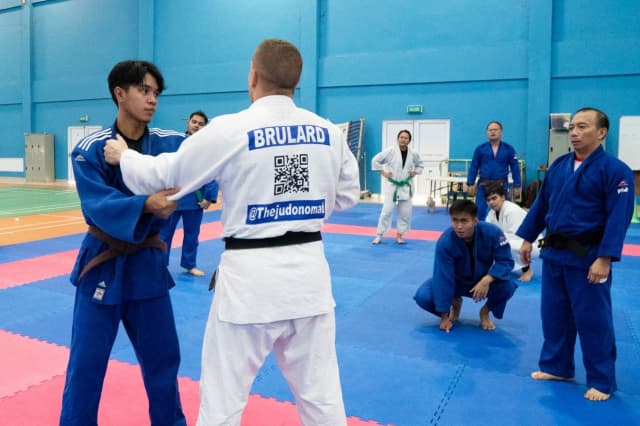Julien’s journey through Brunei and the Philippines as part of his Judo Nomad Project showcases resilience, adaptability, and the power of community. His experiences provide key insights into the challenges and rewards of spreading judo across different cultures.
1. Judo as a Cultural Bridge
Julien’s project is not just about teaching judo; it’s about exchanging cultures, ideas, and values. His approach—immersing himself in local traditions and learning from the communities he visits—creates a deeper connection with his audience.
In Brunei, he combined judo with cultural activities, such as visiting the National Museum and Kampong Ayer.
He introduced judo to practitioners of Pencak Silat, demonstrating how martial arts can influence one another.
In the Philippines, despite logistical challenges, he found ways to engage with different dojos, showing that judo is not just about competition but about unity and learning.
2. Overcoming Hardships & Resilience
Julien faced multiple setbacks, yet his ability to persevere and adapt highlights the essence of judo—falling and rising again.
Unexpected Travel Obstacles: The cancellation of the ferry from Borneo to the Philippines forced him into a long, costly detour.
Robbery & Financial Struggles: Losing his passport, camera, and donations could have ended his project, but support from friends and a successful fundraiser helped him push forward.
Physical & Mental Challenges: From grueling bus rides to training on thin mats, he encountered physical discomfort but remained focused on his mission.
These difficulties reinforced his belief in the power of community and the kindness of strangers.
3. The Role of Community & Support
Throughout his journey, the generosity of individuals and organizations played a crucial role in keeping his project alive.
Mr. Chong & Brunei Judo Federation: Their hospitality and structured itinerary ensured that his visit had a lasting impact.
Dr. Mike Santos & Johannes (Philippines): Their quick intervention helped him organize seminars despite initial uncertainties.
Friends & Sponsors: The IJF’s continued support and donations from his network proved essential after his financial loss.
Julien’s experience highlights the interconnectedness of the judo community worldwide.
4. The Growth of Judo in New Regions
Julien’s observations reveal the challenges that emerging judo communities face.
Brunei’s federation is still young (100 members), but they are passionate and eager to develop.
Filipino clubs train mainly on weekends, making it difficult to conduct regular training sessions.
Limited resources (thin mats, lack of sponsorships) hinder development in some areas, yet dedication remains high.
By bringing international attention to these issues, Julien helps bridge gaps in resources and knowledge.
Conclusion: The Spirit of Judo Lives On
Julien’s journey reflects the true essence of judo—discipline, respect, and perseverance. His story is not just about martial arts but about human connections, overcoming adversity, and sharing knowledge. His ability to turn challenges into learning experiences makes his journey inspiring.
As he moves forward, his call for dojos to invite him is an open invitation for collaboration, ensuring that the Judo Nomad Project continues to impact the global judo community.







